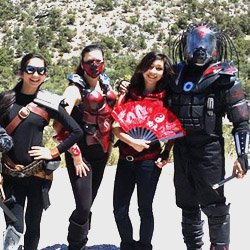Nitsan Gaibel talks with TJ Cuenca who enables normal people to be extraordinary. He founded a school to train anyone to develop into a hero in daily life, whoever they are, no matter what age.
Nitsan: Hey TJ, are you kidding? What kind of school trains superheroes?
TJ Cuenca: I’m a dentist by profession. I’ve been a martial artist since 1976. The style that I teach is a Filipino Martial Art called Ocho Kantos Kali. My wife is the number one adult female knife thrower in the world. Her name is Melody Joy. We’re both members of the International Knife Throwers Hall of Fame. We have a studio here in Las Vegas called Tribal Advantage Systems International. As far as we know, we are the only superhero training studio in the world. We’re also the largest indoor knife-throwing facility in the world. We train kids and adults how to become a hero: someone who’s healthy, empowered, responsible, and outstanding, and there to make a difference in the world around us. So, it’s not about being a hokey, pretend hero. It’s basically becoming social activists in changing the way that people see bullying, about social problems in society, social problems, and making a difference in the things that we see on a daily basis, primarily through children and making them make that distinction between being a watcher and a doer.
Nitsan: I’m guessing that you would say most people have a misconception about what a superhero is.
TJ Cuenca: Absolutely. They think that they need superpowers, they need some sort of incredible ability that is superhuman. We believe that every person has the capability to do something that is more or less super, something’s that unusual, something that they do that’s extraordinary, because it’s something that they enjoy to do. For example, somebody enjoys taking care of children. That would be their superpower because they have that ability to be empathic and understand how a kid thinks. For example, me, I have a tendency to make things, I like to invent things, make things faster, stronger, whether there is a process or a piece of equipment. I also have an incredibly high pain tolerance, so my students say that in a way I’m quite supposedly super heroic in some aspects. So, I do believe that society has a wrong impression. I believe that a hero is someone who does something that is above the norm, outside of the box in the way that they think, to help another human being. A superhero is simply someone who does it more often.
Nitsan: You’re saying that most of us are already heroes. We just don’t do it as often as superheroes.
TJ Cuenca: That’s correct. So, police officers, firefighters, people who work in the military, I consider them superheroes, because they do it above and beyond what would be considered a once-in-a-lifetime thing. A person can be a hero if they donate their kidney as they’re dying. That’s great, but a superhero is somebody who does things that are selfless acts on a regular basis.
Nitsan: You’re saying that all of us actually can be heroes, and with your training, we will become superheroes.
TJ Cuenca: Absolutely, and as far as training’s concerned, it doesn’t just mean the physical aspect but the mental aspect of seeing things differently. I base our philosophy on the research of Dr. Phil Zimbardo, who in 1971 did the Stanford Prison Experiment, where he proved that it’s not the person that changes, it’s not a bad apple in the bunch. The problem is the basket. If the basket is corrupt, people who are good can turn bad, but also, there was a book he wrote called “The Lucifer Effect.” He’s got another one that’s out. It’s called “The Heroic Imagination Project,” which is awesome, where he believes the opposite is true; that if you take people and you put them in a situation where they are empowered, they feel great about themselves, they’re more likely do the right thing. And we do take it to a different level, because he talks more about mental and how somebody is psychologically set up that way where they feel good about themselves and then do wonderful things; whereas to us, we think that somebody is healthy, someone who’s empowered through training, someone who feels that they’re responsible, and they feel that they’re outstanding in what they do. They’re more likely to do things for society and a lot more selfless because they feel good about themselves.
 Every one of us can be a SuperHero.
Every one of us can be a SuperHero.
Nitsan: How do you do this?
TJ Cuenca: There are several ways to do it. First of all, it’s the way that we teach the class. It is what I call: PCP, an acronym for: Praise, Correct, Praise. If a student is doing something correctly, we tell them, “That’s great. That’s an awesome thing, but you can always do better than that,” and once they do it better, we say, “Excellent job.” So, praise, correct, praise. We also try to look for the things that they do right as opposed to the things that they do wrong. So, it’s more about empowerment, but we don’t baby them. For everything that they do correctly, I don’t give them a pat on the head. As a matter of fact in our class, the only time I talk with somebody is if they are kind of screwing up. So, they have an understanding that if they’re being praised, it’s something that they’re doing exceptionally well. They seek that praise because it’s something that they look forward to, and it’s not an overwhelming, not everybody is a winner, and we tell them that. It’s not an “everybody’s-a-winner” kind of mentality. But we want them to feel as if that’s their job with society. We don’t make it too easy. Otherwise, everybody feels entitled.
